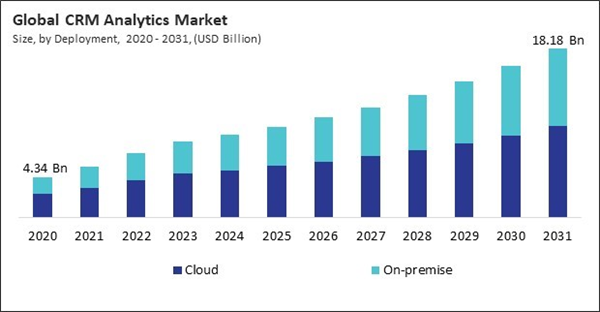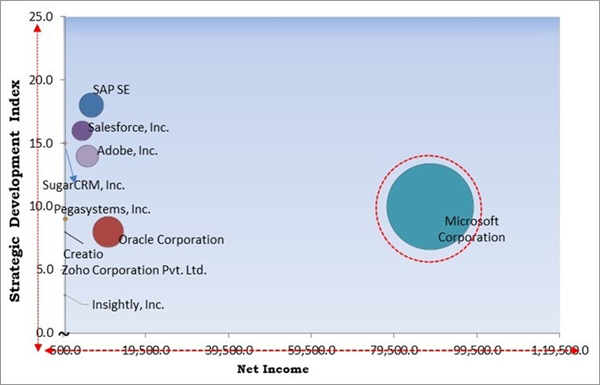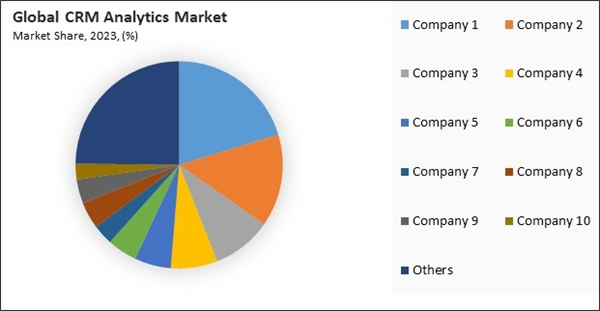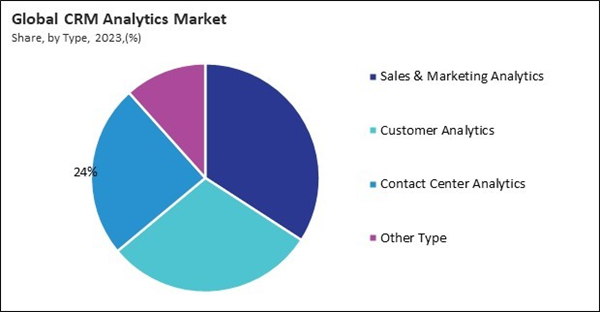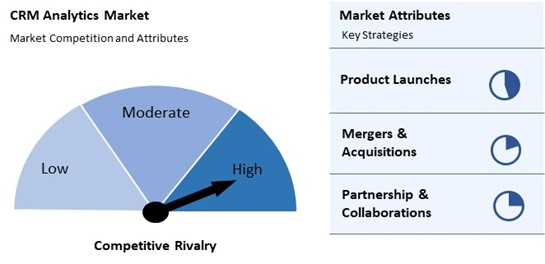Healthcare providers utilize CRM analytics to manage patient relationships, streamline appointment scheduling, and personalize care plans. Analyzing patient data helps improve patient engagement, treatment plan adherence, and overall satisfaction. The increased emphasis on patient-centered care, along with the extensive integration of electronic health records, has markedly advanced the effective application of CRM analytics within the healthcare industry. Thus, the healthcare segment witnessed 17% revenue share in the CRM analytics market in 2023.
The major strategies followed by the market participants are product launches as the key developmental strategy to keep pace with the changing demands of end users. For instance, In October, 2024, Pegasystems Inc. launched Pega Infinity '24.2, enhancing its platform with advanced generative AI features. The update includes expanded AI model support, custom Pega GenAI Coaches, and deeper customer insights with Pega Customer Decision Hub. New features also improve the user experience and optimize workflows in Pega Platform, Pega Customer Service, and Pega Sales Automation. These innovations help enterprises accelerate digital transformation and improve customer engagement across industries. Additionally, In September, 2024, Oracle introduced new AI-powered capabilities for Oracle Fusion Data Intelligence, enabling organizations to derive actionable insights from their business data. A key feature includes native support for Salesforce CRM, allowing Salesforce customers to combine CRM data with Oracle Fusion Cloud Applications to improve data quality and enhance cross-functional analysis. These innovations aim to accelerate decision-making and help organizations act faster to seize business opportunities.
Cardinal Matrix - Market Competition Analysis
Based on the Analysis presented in the Cardinal matrix; Microsoft Corporation is the forerunner in the CRM Analytics Market. Companies such as Oracle Corporation, SAP SE, Salesforce, Inc. are some of the key innovators in CRM Analytics Market. In March, 2023, Microsoft Corporation introduced Dynamics 365 Copilot, an AI-driven assistant integrated into its CRM and ERP systems, to automate tasks across sales, marketing, customer service, and supply chain functions. The platform utilizes generative AI to enhance user productivity, simplify data exploration, and deliver personalized insights, ultimately improving customer engagement and operational efficiency across industries.Market Growth Factors
Businesses across industries are shifting their CRM operations to cloud platforms due to these solutions' numerous benefits. Cloud-based CRM analytics tools provide unmatched scalability, allowing organizations to expand their systems seamlessly as their business grows.Additionally, recognizing consumer behavior is essential for enterprises to formulate and execute effective strategies. CRM analytics tools enable organizations to gather and analyze extensive volumes of data from various interfaces, including social media platforms, websites, email communications, and in-person interactions. Thus, the demand for robust CRM analytics tools grows as organizations strive to align their operations with their customers' evolving preferences.
Market Restraining Factors
Stringent data protection regulations, such as the General Data Protection Regulation (GDPR) in Europe and the California Consumer Privacy Act (CCPA) in the United States, add to these challenges. These laws mandate rigorous compliance measures, requiring organizations to obtain explicit consent for data usage, ensure data is securely stored, and provide customers with control over their information. As a result, data security and privacy concerns not only delay the adoption of CRM analytics solutions but also restrict the scope of their implementation, ultimately impacting market growth.The leading players in the market are competing with diverse innovative offerings to remain competitive in the market. The above illustration shows the percentage of revenue shared by some of the leading companies in the market. The leading players of the market are adopting various strategies in order to cater demand coming from the different industries. The key developmental strategies in the market are Product Launches and Product Expansions.
Driving and Restraining Factors
Drivers- Increased Adoption of Cloud-Based Solutions
- Rising Demand for Customer-Centric Strategies
- Rapid Growth in Big Data and IoT Adoption
- Data Security and Privacy Concerns
- Challenge of Integration of CRM Analytics Tools with Existing Systems
- Advancements in Artificial Intelligence (AI) and Machine Learning (ML)
- Increased Focus on Omnichannel Customer Engagement
- Substantially High Implementation Costs
- Skill Gap and Workforce Resistance
End User Outlook
On the basis of end-user, the market is classified into retail, BFSI, healthcare, media & entertainment, telecom & IT, transportation & logistics, and others. The retail segment acquired 23% revenue share in the market in 2023. This prominence is driven by retailers' increasing adoption of CRM analytics to understand consumer behavior, personalize marketing efforts, and enhance customer experiences.Type Outlook
By type, the market is divided into sales & marketing analytics, customer analytics, contact center analytics, and others. The sales & marketing analytics segment garnered 34% revenue share in the market in 2023. This segment's growth is fueled by businesses increasingly focusing on data-driven strategies to optimize their sales and marketing efforts. Organizations use sales and marketing analytics to monitor campaign performance, identify high-value prospects, and forecast sales trends.Deployment Outlook
Based on deployment, the market is bifurcated into cloud and on-premise. The on-premise segment procured 43% revenue share in the market in 2023. On-premise solutions allow businesses to store sensitive customer information within their servers, addressing regulatory compliance and security breach concerns.Market Competition and Attributes
The CRM Analytics Market is intensely competitive, driven by advancements in AI, IoT, and cloud computing. Market participants prioritize integrating cloud technologies to enhance robot functionality, scalability, and real-time data processing. Collaborative ecosystems involving cloud providers, robotics manufacturers, and enterprises are key to innovation and deployment. Competition is fueled by demand for cloud-enabled robotics across industries like manufacturing, healthcare, logistics, and agriculture. The market's growth is shaped by the push for automation, operational efficiency, and the adoption of AI-driven robotic solutions.
By Regional Analysis
Region-wise, the market is analyzed across North America, Europe, Asia Pacific, and LAMEA. The Europe segment recorded 31% revenue share in the market in 2023. Factors contributing to growth encompass the heightened emphasis on digital transformation and the implementation of rigorous data protection regulations, such as the General Data Protection Regulation (GDPR), which underscore the necessity of efficient as well as secure data management.Recent Strategies Deployed in the Market
- Oct-2024: Pegasystems Inc. launched Pega Infinity '24.2, enhancing its platform with advanced generative AI features. The update includes expanded AI model support, custom Pega GenAI Coaches, and deeper customer insights with Pega Customer Decision Hub. New features also improve the user experience and optimize workflows in Pega Platform, Pega Customer Service, and Pega Sales Automation. These innovations help enterprises accelerate digital transformation and improve customer engagement across industries.
- Sep-2024: Adobe Inc. launched its Adobe Journey Optimizer (AJO) B2B Edition, leveraging generative AI to offer businesses deeper customer insights and personalized experiences. This solution helps B2B marketers better engage with customers by analyzing buying groups and automating personalized content creation. The integration with Adobe Experience Cloud applications, including Marketo Engage and Adobe Real-Time Customer Data Platform, provides real-time insights and recommendations, enhancing enterprise sales and marketing efforts.
- Sep-2024: Oracle introduced AI-powered capabilities for Oracle Fusion Data Intelligence, enabling organizations to derive actionable insights from their business data. A key feature includes native support for Salesforce CRM, allowing Salesforce customers to combine CRM data with Oracle Fusion Cloud Applications to improve data quality and enhance cross-functional analysis. These innovations aim to accelerate decision-making and help organizations act faster to seize business opportunities.
- Aug-2024: Zoho Corporation introduced "Zoho CRM for Everyone," a new approach to CRM aimed at democratizing customer relationship management across teams. This update enhances collaboration by providing a user-friendly interface and features like Teamspaces, Team Modules, and Requests. These capabilities allow various departments such as marketing, sales, and legal to seamlessly work together within the same CRM system. By empowering teams to manage their own processes and fostering direct coordination between teams, Zoho CRM for Everyone aims to improve customer context, reduce fragmentation, and streamline workflows.
- May-2024: Salesforce, Inc. expanded its collaboration with IBM, integrating Salesforce’s Einstein 1 and IBM’s Watsonx AI platforms. The collaboration enhances CRM analytics by introducing bidirectional data sharing, customizable large language models (LLMs), and industry-specific AI-driven templates. Customers can access IBM Granite AI models for tasks like content generation and summarization.
- Feb-2024: Salesforce, Inc. took over Spiff, a U.S.-based provider of incentive compensation management software. This integration enhances Salesforce’s Sales Performance Management solutions by embedding transparent compensation and strategic planning capabilities into its CRM. Spiff’s low-code platform enables automation of complex commission processes. This acquisition empowers Salesforce to provide deeper analytics for aligning compensation strategies with sales performance, supporting financial and sales teams in boosting revenue growth.
List of Key Companies Profiled
- Salesforce, Inc.
- Microsoft Corporation
- SAP SE
- Oracle Corporation
- Zoho Corporation Pvt. Ltd.
- Pegasystems, Inc.
- Adobe, Inc.
- SugarCRM, Inc.
- Insightly, Inc.
- Creatio
Market Report Segmentation
By Deployment- Cloud
- On-premise
- Retail
- BFSI
- Healthcare
- Media & Entertainment
- Telecom & IT
- Transportation & Logistics
- Other End-User
- Sales & Marketing Analytics
- Customer Analytics
- Contact Center Analytics
- Other Type
- North America
- US
- Canada
- Mexico
- Rest of North America
- Europe
- Germany
- UK
- France
- Russia
- Spain
- Italy
- Rest of Europe
- Asia Pacific
- China
- Japan
- India
- South Korea
- Singapore
- Malaysia
- Rest of Asia Pacific
- LAMEA
- Brazil
- Argentina
- UAE
- Saudi Arabia
- South Africa
- Nigeria
- Rest of LAMEA
Table of Contents
Companies Mentioned
- Salesforce, Inc.
- Microsoft Corporation
- SAP SE
- Oracle Corporation
- Zoho Corporation Pvt. Ltd.
- Pegasystems, Inc.
- Adobe, Inc.
- SugarCRM, Inc.
- Insightly, Inc.
- Creatio



